Should Prostitution be legalized?
VerifiedAdded on 2023/06/03
|16
|4666
|168
AI Summary
This article analyzes the need for the illegalization of prostitution. It recognizes three essential features of the study topic: vulnerability, understanding consent, and financial inducements. The article discusses the four major description options for prostitution and their bioethical relevance. The writer's position is underpinned by the Kantianism theory, which states that prostitution degrades and objectifies humanity. The consequential ethical theory supports the otherwise position.
Contribute Materials
Your contribution can guide someone’s learning journey. Share your
documents today.
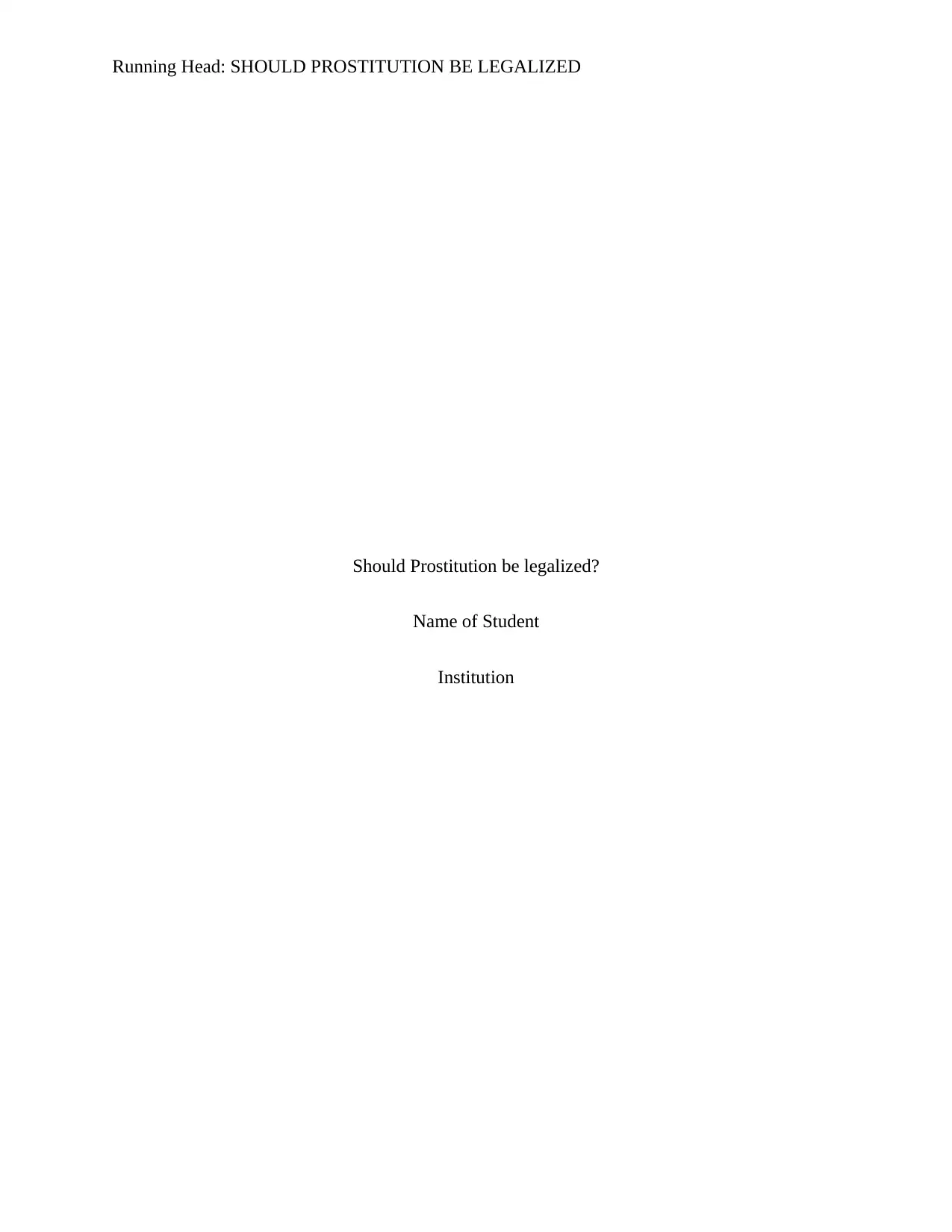
Running Head: SHOULD PROSTITUTION BE LEGALIZED
Should Prostitution be legalized?
Name of Student
Institution
Should Prostitution be legalized?
Name of Student
Institution
Secure Best Marks with AI Grader
Need help grading? Try our AI Grader for instant feedback on your assignments.
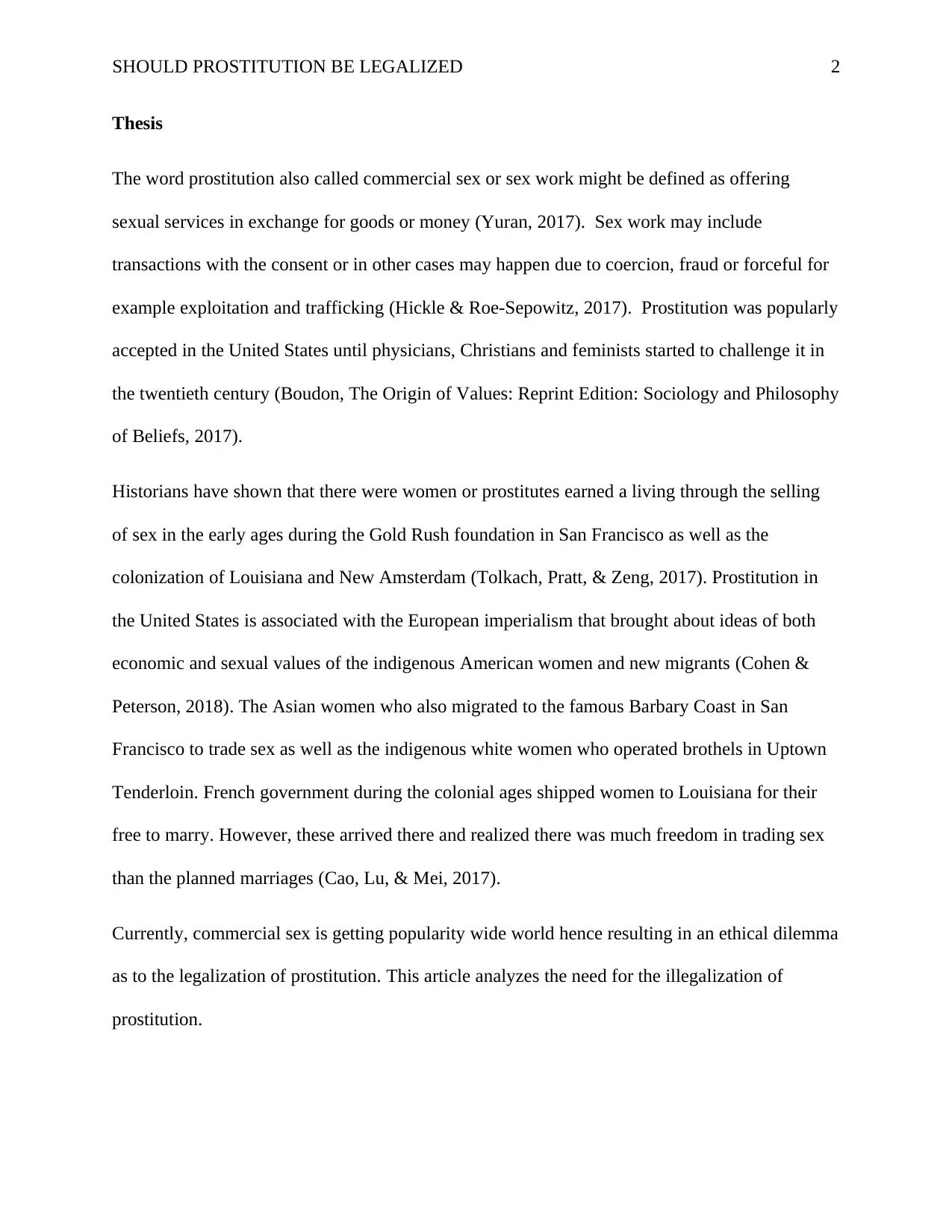
SHOULD PROSTITUTION BE LEGALIZED 2
Thesis
The word prostitution also called commercial sex or sex work might be defined as offering
sexual services in exchange for goods or money (Yuran, 2017). Sex work may include
transactions with the consent or in other cases may happen due to coercion, fraud or forceful for
example exploitation and trafficking (Hickle & Roe-Sepowitz, 2017). Prostitution was popularly
accepted in the United States until physicians, Christians and feminists started to challenge it in
the twentieth century (Boudon, The Origin of Values: Reprint Edition: Sociology and Philosophy
of Beliefs, 2017).
Historians have shown that there were women or prostitutes earned a living through the selling
of sex in the early ages during the Gold Rush foundation in San Francisco as well as the
colonization of Louisiana and New Amsterdam (Tolkach, Pratt, & Zeng, 2017). Prostitution in
the United States is associated with the European imperialism that brought about ideas of both
economic and sexual values of the indigenous American women and new migrants (Cohen &
Peterson, 2018). The Asian women who also migrated to the famous Barbary Coast in San
Francisco to trade sex as well as the indigenous white women who operated brothels in Uptown
Tenderloin. French government during the colonial ages shipped women to Louisiana for their
free to marry. However, these arrived there and realized there was much freedom in trading sex
than the planned marriages (Cao, Lu, & Mei, 2017).
Currently, commercial sex is getting popularity wide world hence resulting in an ethical dilemma
as to the legalization of prostitution. This article analyzes the need for the illegalization of
prostitution.
Thesis
The word prostitution also called commercial sex or sex work might be defined as offering
sexual services in exchange for goods or money (Yuran, 2017). Sex work may include
transactions with the consent or in other cases may happen due to coercion, fraud or forceful for
example exploitation and trafficking (Hickle & Roe-Sepowitz, 2017). Prostitution was popularly
accepted in the United States until physicians, Christians and feminists started to challenge it in
the twentieth century (Boudon, The Origin of Values: Reprint Edition: Sociology and Philosophy
of Beliefs, 2017).
Historians have shown that there were women or prostitutes earned a living through the selling
of sex in the early ages during the Gold Rush foundation in San Francisco as well as the
colonization of Louisiana and New Amsterdam (Tolkach, Pratt, & Zeng, 2017). Prostitution in
the United States is associated with the European imperialism that brought about ideas of both
economic and sexual values of the indigenous American women and new migrants (Cohen &
Peterson, 2018). The Asian women who also migrated to the famous Barbary Coast in San
Francisco to trade sex as well as the indigenous white women who operated brothels in Uptown
Tenderloin. French government during the colonial ages shipped women to Louisiana for their
free to marry. However, these arrived there and realized there was much freedom in trading sex
than the planned marriages (Cao, Lu, & Mei, 2017).
Currently, commercial sex is getting popularity wide world hence resulting in an ethical dilemma
as to the legalization of prostitution. This article analyzes the need for the illegalization of
prostitution.
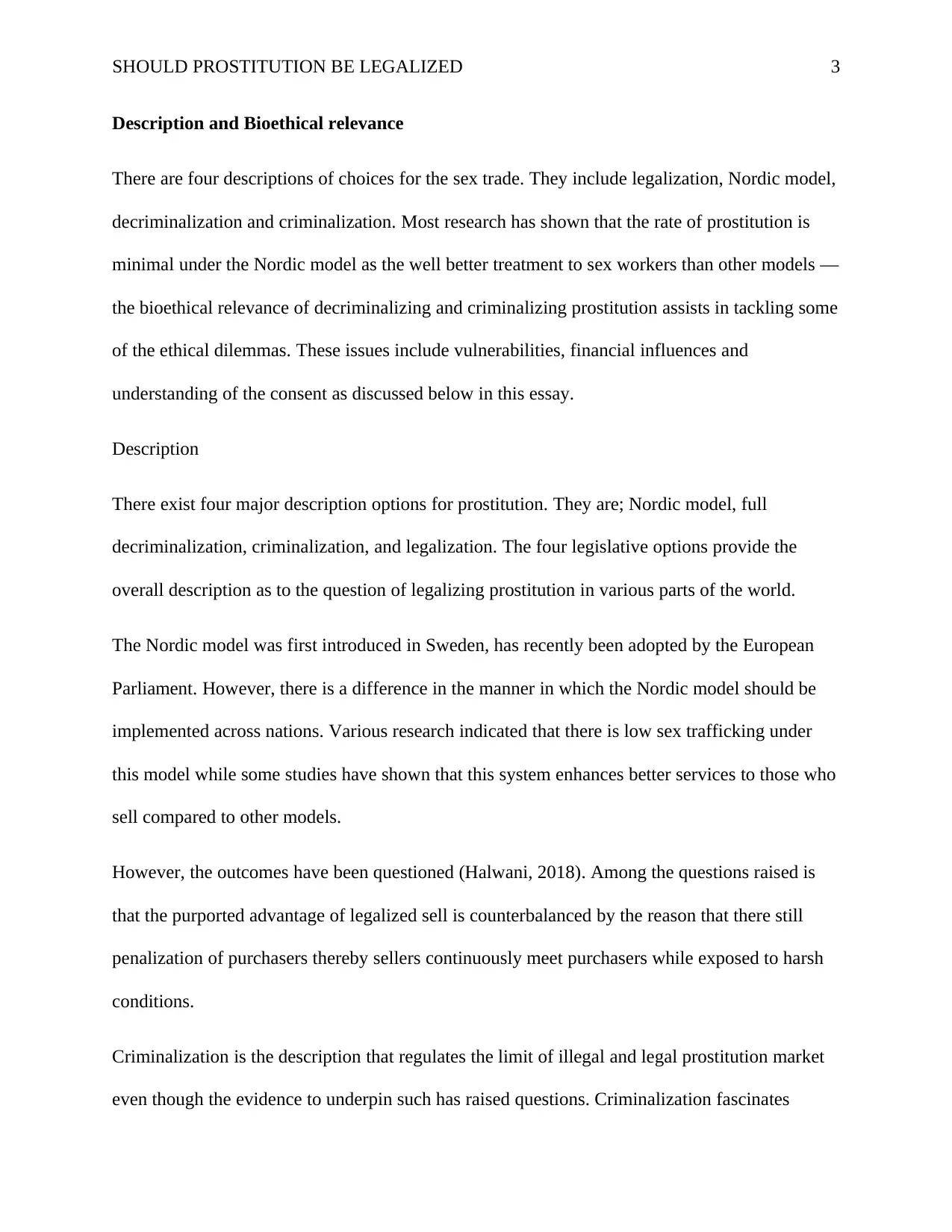
SHOULD PROSTITUTION BE LEGALIZED 3
Description and Bioethical relevance
There are four descriptions of choices for the sex trade. They include legalization, Nordic model,
decriminalization and criminalization. Most research has shown that the rate of prostitution is
minimal under the Nordic model as the well better treatment to sex workers than other models —
the bioethical relevance of decriminalizing and criminalizing prostitution assists in tackling some
of the ethical dilemmas. These issues include vulnerabilities, financial influences and
understanding of the consent as discussed below in this essay.
Description
There exist four major description options for prostitution. They are; Nordic model, full
decriminalization, criminalization, and legalization. The four legislative options provide the
overall description as to the question of legalizing prostitution in various parts of the world.
The Nordic model was first introduced in Sweden, has recently been adopted by the European
Parliament. However, there is a difference in the manner in which the Nordic model should be
implemented across nations. Various research indicated that there is low sex trafficking under
this model while some studies have shown that this system enhances better services to those who
sell compared to other models.
However, the outcomes have been questioned (Halwani, 2018). Among the questions raised is
that the purported advantage of legalized sell is counterbalanced by the reason that there still
penalization of purchasers thereby sellers continuously meet purchasers while exposed to harsh
conditions.
Criminalization is the description that regulates the limit of illegal and legal prostitution market
even though the evidence to underpin such has raised questions. Criminalization fascinates
Description and Bioethical relevance
There are four descriptions of choices for the sex trade. They include legalization, Nordic model,
decriminalization and criminalization. Most research has shown that the rate of prostitution is
minimal under the Nordic model as the well better treatment to sex workers than other models —
the bioethical relevance of decriminalizing and criminalizing prostitution assists in tackling some
of the ethical dilemmas. These issues include vulnerabilities, financial influences and
understanding of the consent as discussed below in this essay.
Description
There exist four major description options for prostitution. They are; Nordic model, full
decriminalization, criminalization, and legalization. The four legislative options provide the
overall description as to the question of legalizing prostitution in various parts of the world.
The Nordic model was first introduced in Sweden, has recently been adopted by the European
Parliament. However, there is a difference in the manner in which the Nordic model should be
implemented across nations. Various research indicated that there is low sex trafficking under
this model while some studies have shown that this system enhances better services to those who
sell compared to other models.
However, the outcomes have been questioned (Halwani, 2018). Among the questions raised is
that the purported advantage of legalized sell is counterbalanced by the reason that there still
penalization of purchasers thereby sellers continuously meet purchasers while exposed to harsh
conditions.
Criminalization is the description that regulates the limit of illegal and legal prostitution market
even though the evidence to underpin such has raised questions. Criminalization fascinates
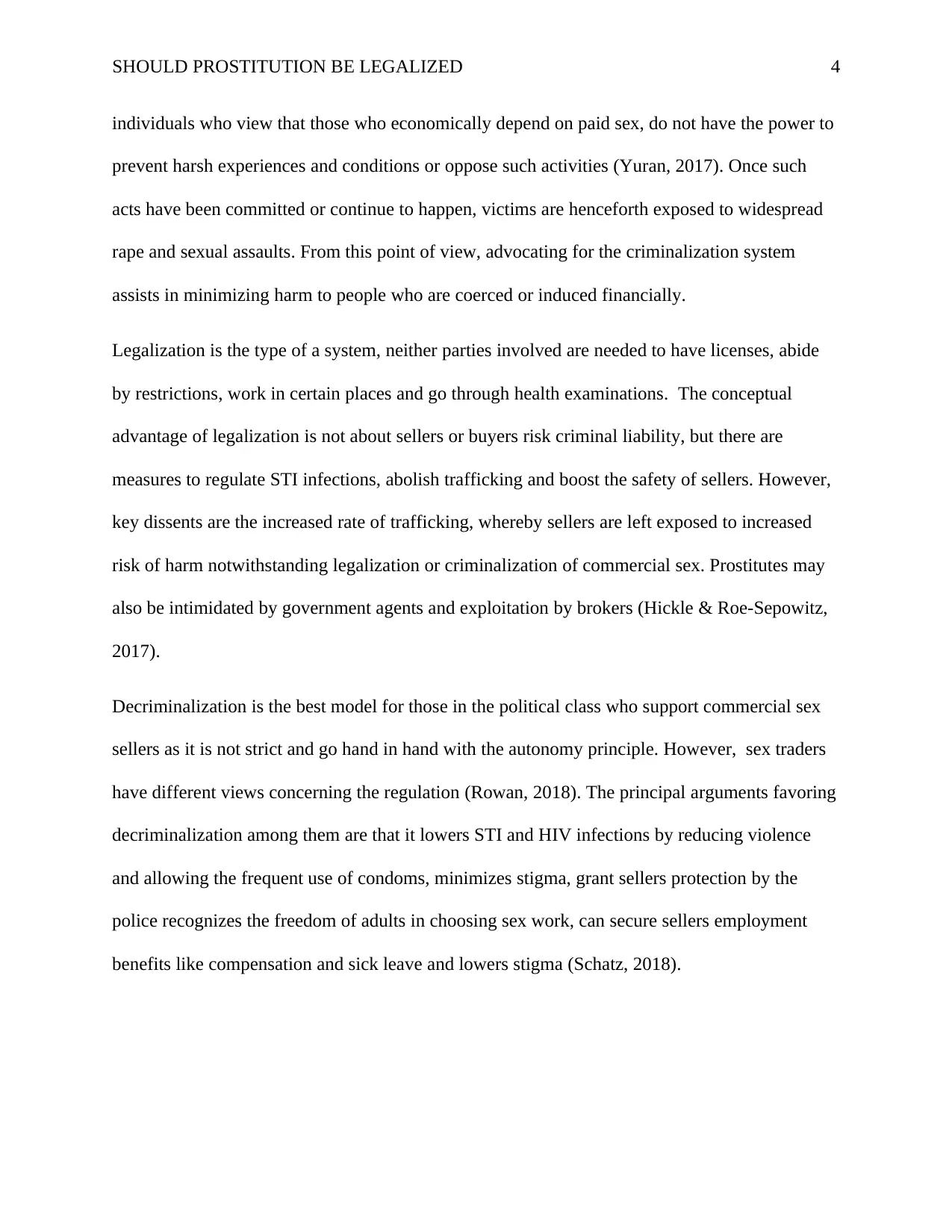
SHOULD PROSTITUTION BE LEGALIZED 4
individuals who view that those who economically depend on paid sex, do not have the power to
prevent harsh experiences and conditions or oppose such activities (Yuran, 2017). Once such
acts have been committed or continue to happen, victims are henceforth exposed to widespread
rape and sexual assaults. From this point of view, advocating for the criminalization system
assists in minimizing harm to people who are coerced or induced financially.
Legalization is the type of a system, neither parties involved are needed to have licenses, abide
by restrictions, work in certain places and go through health examinations. The conceptual
advantage of legalization is not about sellers or buyers risk criminal liability, but there are
measures to regulate STI infections, abolish trafficking and boost the safety of sellers. However,
key dissents are the increased rate of trafficking, whereby sellers are left exposed to increased
risk of harm notwithstanding legalization or criminalization of commercial sex. Prostitutes may
also be intimidated by government agents and exploitation by brokers (Hickle & Roe-Sepowitz,
2017).
Decriminalization is the best model for those in the political class who support commercial sex
sellers as it is not strict and go hand in hand with the autonomy principle. However, sex traders
have different views concerning the regulation (Rowan, 2018). The principal arguments favoring
decriminalization among them are that it lowers STI and HIV infections by reducing violence
and allowing the frequent use of condoms, minimizes stigma, grant sellers protection by the
police recognizes the freedom of adults in choosing sex work, can secure sellers employment
benefits like compensation and sick leave and lowers stigma (Schatz, 2018).
individuals who view that those who economically depend on paid sex, do not have the power to
prevent harsh experiences and conditions or oppose such activities (Yuran, 2017). Once such
acts have been committed or continue to happen, victims are henceforth exposed to widespread
rape and sexual assaults. From this point of view, advocating for the criminalization system
assists in minimizing harm to people who are coerced or induced financially.
Legalization is the type of a system, neither parties involved are needed to have licenses, abide
by restrictions, work in certain places and go through health examinations. The conceptual
advantage of legalization is not about sellers or buyers risk criminal liability, but there are
measures to regulate STI infections, abolish trafficking and boost the safety of sellers. However,
key dissents are the increased rate of trafficking, whereby sellers are left exposed to increased
risk of harm notwithstanding legalization or criminalization of commercial sex. Prostitutes may
also be intimidated by government agents and exploitation by brokers (Hickle & Roe-Sepowitz,
2017).
Decriminalization is the best model for those in the political class who support commercial sex
sellers as it is not strict and go hand in hand with the autonomy principle. However, sex traders
have different views concerning the regulation (Rowan, 2018). The principal arguments favoring
decriminalization among them are that it lowers STI and HIV infections by reducing violence
and allowing the frequent use of condoms, minimizes stigma, grant sellers protection by the
police recognizes the freedom of adults in choosing sex work, can secure sellers employment
benefits like compensation and sick leave and lowers stigma (Schatz, 2018).
Secure Best Marks with AI Grader
Need help grading? Try our AI Grader for instant feedback on your assignments.
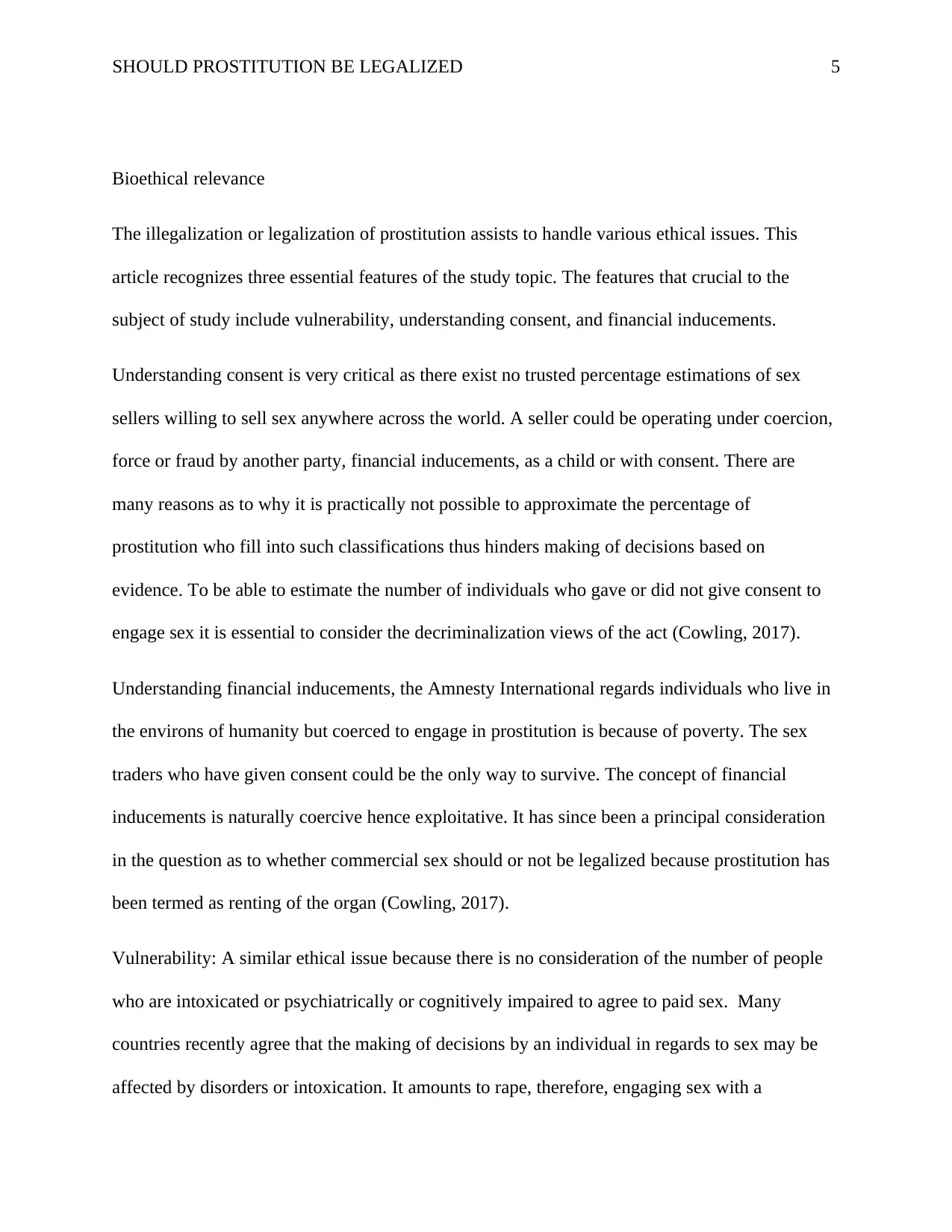
SHOULD PROSTITUTION BE LEGALIZED 5
Bioethical relevance
The illegalization or legalization of prostitution assists to handle various ethical issues. This
article recognizes three essential features of the study topic. The features that crucial to the
subject of study include vulnerability, understanding consent, and financial inducements.
Understanding consent is very critical as there exist no trusted percentage estimations of sex
sellers willing to sell sex anywhere across the world. A seller could be operating under coercion,
force or fraud by another party, financial inducements, as a child or with consent. There are
many reasons as to why it is practically not possible to approximate the percentage of
prostitution who fill into such classifications thus hinders making of decisions based on
evidence. To be able to estimate the number of individuals who gave or did not give consent to
engage sex it is essential to consider the decriminalization views of the act (Cowling, 2017).
Understanding financial inducements, the Amnesty International regards individuals who live in
the environs of humanity but coerced to engage in prostitution is because of poverty. The sex
traders who have given consent could be the only way to survive. The concept of financial
inducements is naturally coercive hence exploitative. It has since been a principal consideration
in the question as to whether commercial sex should or not be legalized because prostitution has
been termed as renting of the organ (Cowling, 2017).
Vulnerability: A similar ethical issue because there is no consideration of the number of people
who are intoxicated or psychiatrically or cognitively impaired to agree to paid sex. Many
countries recently agree that the making of decisions by an individual in regards to sex may be
affected by disorders or intoxication. It amounts to rape, therefore, engaging sex with a
Bioethical relevance
The illegalization or legalization of prostitution assists to handle various ethical issues. This
article recognizes three essential features of the study topic. The features that crucial to the
subject of study include vulnerability, understanding consent, and financial inducements.
Understanding consent is very critical as there exist no trusted percentage estimations of sex
sellers willing to sell sex anywhere across the world. A seller could be operating under coercion,
force or fraud by another party, financial inducements, as a child or with consent. There are
many reasons as to why it is practically not possible to approximate the percentage of
prostitution who fill into such classifications thus hinders making of decisions based on
evidence. To be able to estimate the number of individuals who gave or did not give consent to
engage sex it is essential to consider the decriminalization views of the act (Cowling, 2017).
Understanding financial inducements, the Amnesty International regards individuals who live in
the environs of humanity but coerced to engage in prostitution is because of poverty. The sex
traders who have given consent could be the only way to survive. The concept of financial
inducements is naturally coercive hence exploitative. It has since been a principal consideration
in the question as to whether commercial sex should or not be legalized because prostitution has
been termed as renting of the organ (Cowling, 2017).
Vulnerability: A similar ethical issue because there is no consideration of the number of people
who are intoxicated or psychiatrically or cognitively impaired to agree to paid sex. Many
countries recently agree that the making of decisions by an individual in regards to sex may be
affected by disorders or intoxication. It amounts to rape, therefore, engaging sex with a
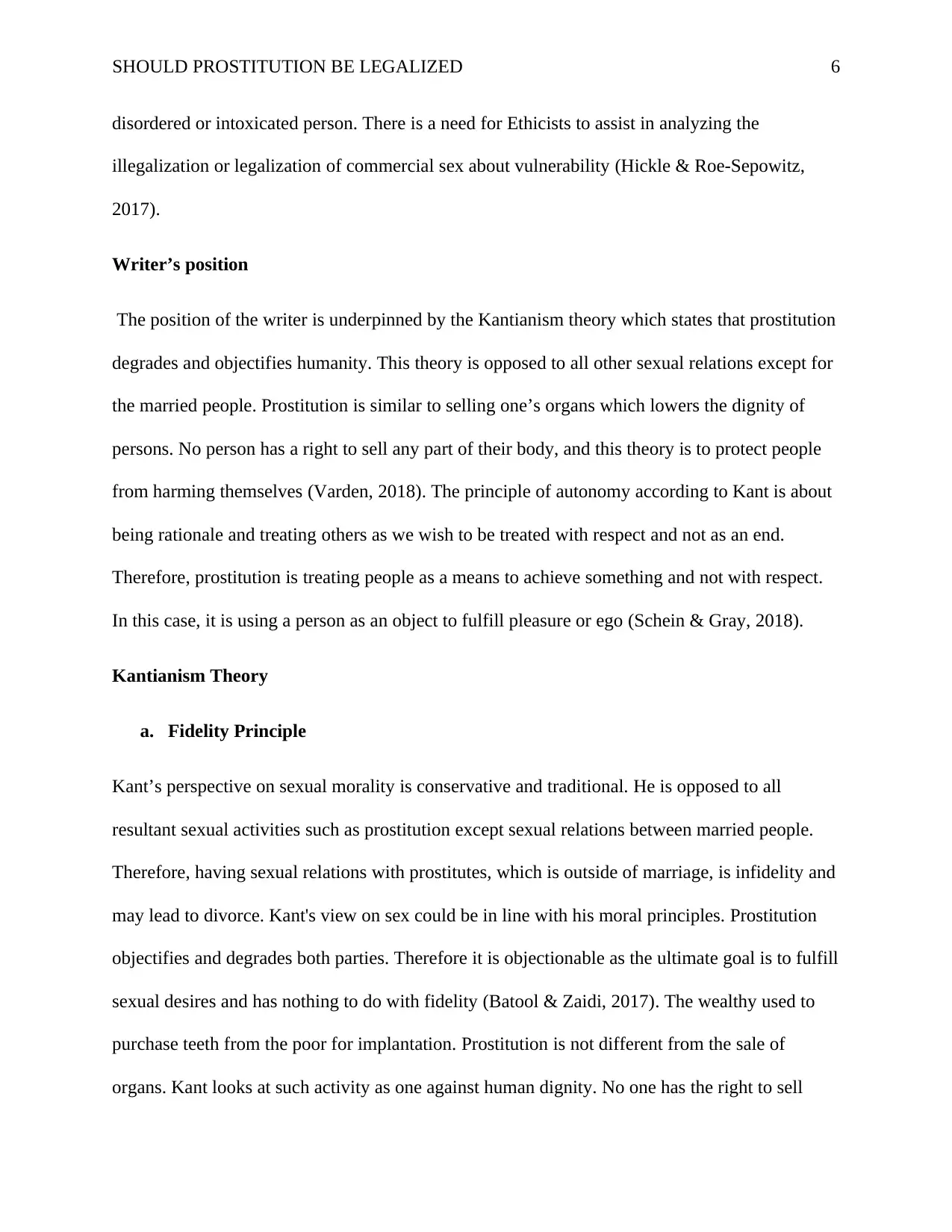
SHOULD PROSTITUTION BE LEGALIZED 6
disordered or intoxicated person. There is a need for Ethicists to assist in analyzing the
illegalization or legalization of commercial sex about vulnerability (Hickle & Roe-Sepowitz,
2017).
Writer’s position
The position of the writer is underpinned by the Kantianism theory which states that prostitution
degrades and objectifies humanity. This theory is opposed to all other sexual relations except for
the married people. Prostitution is similar to selling one’s organs which lowers the dignity of
persons. No person has a right to sell any part of their body, and this theory is to protect people
from harming themselves (Varden, 2018). The principle of autonomy according to Kant is about
being rationale and treating others as we wish to be treated with respect and not as an end.
Therefore, prostitution is treating people as a means to achieve something and not with respect.
In this case, it is using a person as an object to fulfill pleasure or ego (Schein & Gray, 2018).
Kantianism Theory
a. Fidelity Principle
Kant’s perspective on sexual morality is conservative and traditional. He is opposed to all
resultant sexual activities such as prostitution except sexual relations between married people.
Therefore, having sexual relations with prostitutes, which is outside of marriage, is infidelity and
may lead to divorce. Kant's view on sex could be in line with his moral principles. Prostitution
objectifies and degrades both parties. Therefore it is objectionable as the ultimate goal is to fulfill
sexual desires and has nothing to do with fidelity (Batool & Zaidi, 2017). The wealthy used to
purchase teeth from the poor for implantation. Prostitution is not different from the sale of
organs. Kant looks at such activity as one against human dignity. No one has the right to sell
disordered or intoxicated person. There is a need for Ethicists to assist in analyzing the
illegalization or legalization of commercial sex about vulnerability (Hickle & Roe-Sepowitz,
2017).
Writer’s position
The position of the writer is underpinned by the Kantianism theory which states that prostitution
degrades and objectifies humanity. This theory is opposed to all other sexual relations except for
the married people. Prostitution is similar to selling one’s organs which lowers the dignity of
persons. No person has a right to sell any part of their body, and this theory is to protect people
from harming themselves (Varden, 2018). The principle of autonomy according to Kant is about
being rationale and treating others as we wish to be treated with respect and not as an end.
Therefore, prostitution is treating people as a means to achieve something and not with respect.
In this case, it is using a person as an object to fulfill pleasure or ego (Schein & Gray, 2018).
Kantianism Theory
a. Fidelity Principle
Kant’s perspective on sexual morality is conservative and traditional. He is opposed to all
resultant sexual activities such as prostitution except sexual relations between married people.
Therefore, having sexual relations with prostitutes, which is outside of marriage, is infidelity and
may lead to divorce. Kant's view on sex could be in line with his moral principles. Prostitution
objectifies and degrades both parties. Therefore it is objectionable as the ultimate goal is to fulfill
sexual desires and has nothing to do with fidelity (Batool & Zaidi, 2017). The wealthy used to
purchase teeth from the poor for implantation. Prostitution is not different from the sale of
organs. Kant looks at such activity as one against human dignity. No one has the right to sell
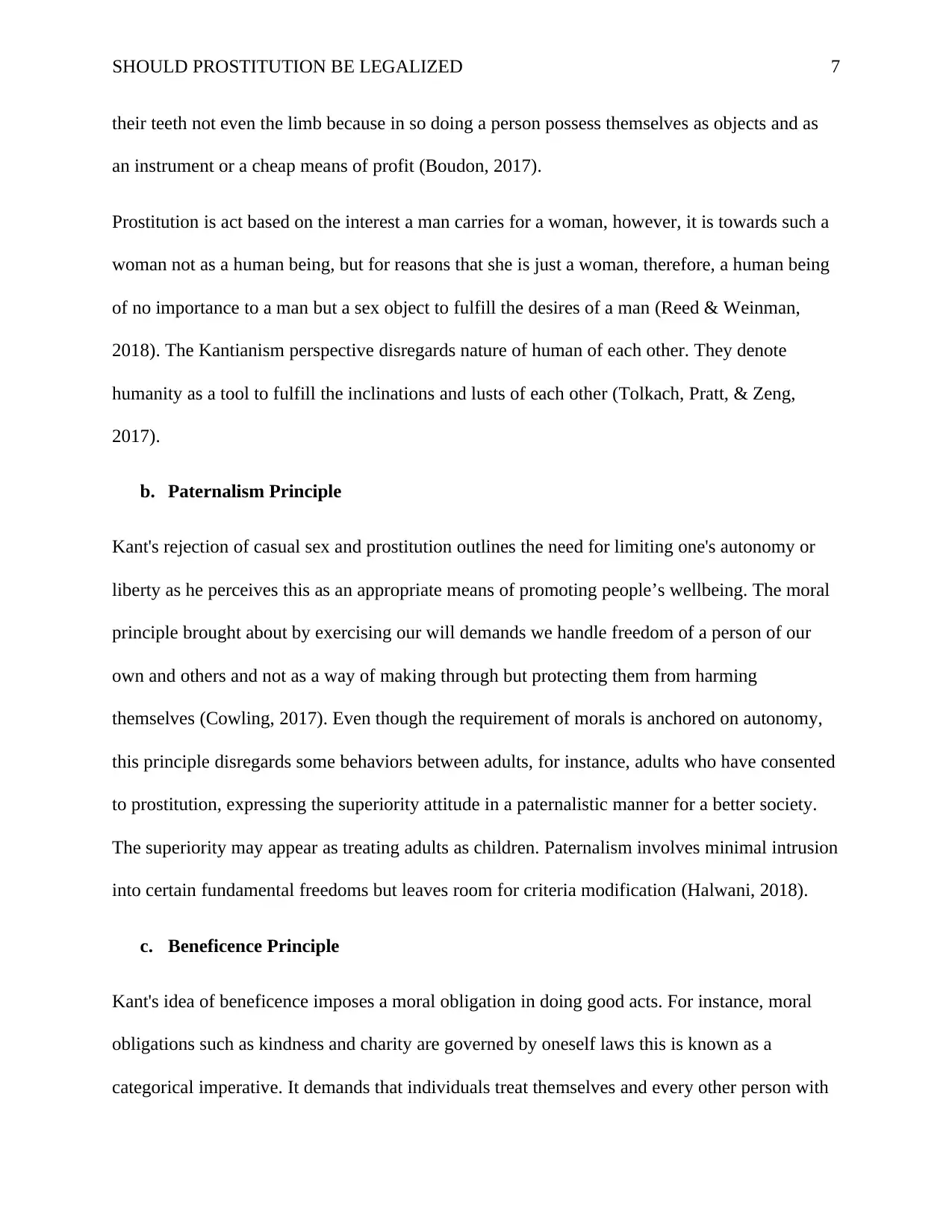
SHOULD PROSTITUTION BE LEGALIZED 7
their teeth not even the limb because in so doing a person possess themselves as objects and as
an instrument or a cheap means of profit (Boudon, 2017).
Prostitution is act based on the interest a man carries for a woman, however, it is towards such a
woman not as a human being, but for reasons that she is just a woman, therefore, a human being
of no importance to a man but a sex object to fulfill the desires of a man (Reed & Weinman,
2018). The Kantianism perspective disregards nature of human of each other. They denote
humanity as a tool to fulfill the inclinations and lusts of each other (Tolkach, Pratt, & Zeng,
2017).
b. Paternalism Principle
Kant's rejection of casual sex and prostitution outlines the need for limiting one's autonomy or
liberty as he perceives this as an appropriate means of promoting people’s wellbeing. The moral
principle brought about by exercising our will demands we handle freedom of a person of our
own and others and not as a way of making through but protecting them from harming
themselves (Cowling, 2017). Even though the requirement of morals is anchored on autonomy,
this principle disregards some behaviors between adults, for instance, adults who have consented
to prostitution, expressing the superiority attitude in a paternalistic manner for a better society.
The superiority may appear as treating adults as children. Paternalism involves minimal intrusion
into certain fundamental freedoms but leaves room for criteria modification (Halwani, 2018).
c. Beneficence Principle
Kant's idea of beneficence imposes a moral obligation in doing good acts. For instance, moral
obligations such as kindness and charity are governed by oneself laws this is known as a
categorical imperative. It demands that individuals treat themselves and every other person with
their teeth not even the limb because in so doing a person possess themselves as objects and as
an instrument or a cheap means of profit (Boudon, 2017).
Prostitution is act based on the interest a man carries for a woman, however, it is towards such a
woman not as a human being, but for reasons that she is just a woman, therefore, a human being
of no importance to a man but a sex object to fulfill the desires of a man (Reed & Weinman,
2018). The Kantianism perspective disregards nature of human of each other. They denote
humanity as a tool to fulfill the inclinations and lusts of each other (Tolkach, Pratt, & Zeng,
2017).
b. Paternalism Principle
Kant's rejection of casual sex and prostitution outlines the need for limiting one's autonomy or
liberty as he perceives this as an appropriate means of promoting people’s wellbeing. The moral
principle brought about by exercising our will demands we handle freedom of a person of our
own and others and not as a way of making through but protecting them from harming
themselves (Cowling, 2017). Even though the requirement of morals is anchored on autonomy,
this principle disregards some behaviors between adults, for instance, adults who have consented
to prostitution, expressing the superiority attitude in a paternalistic manner for a better society.
The superiority may appear as treating adults as children. Paternalism involves minimal intrusion
into certain fundamental freedoms but leaves room for criteria modification (Halwani, 2018).
c. Beneficence Principle
Kant's idea of beneficence imposes a moral obligation in doing good acts. For instance, moral
obligations such as kindness and charity are governed by oneself laws this is known as a
categorical imperative. It demands that individuals treat themselves and every other person with
Paraphrase This Document
Need a fresh take? Get an instant paraphrase of this document with our AI Paraphraser
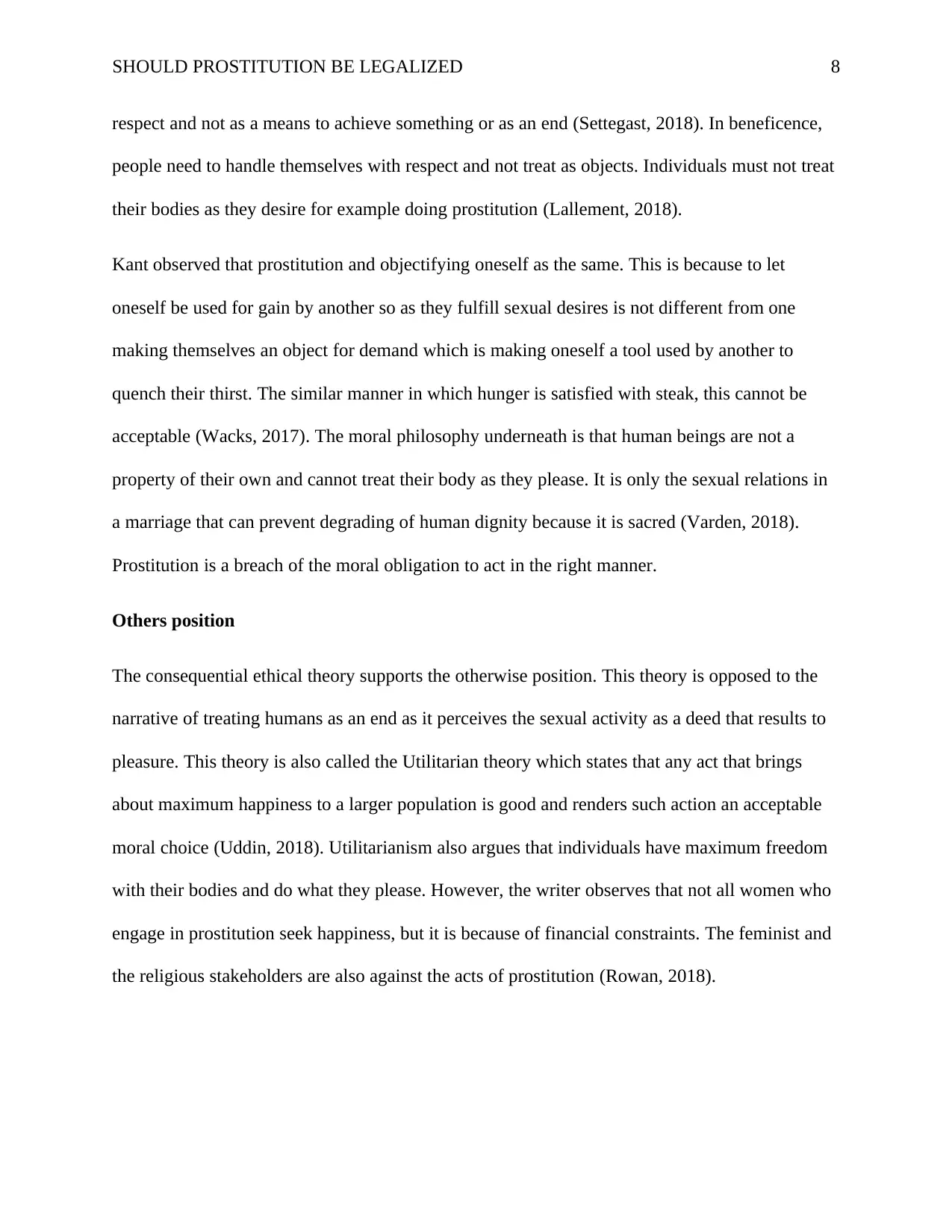
SHOULD PROSTITUTION BE LEGALIZED 8
respect and not as a means to achieve something or as an end (Settegast, 2018). In beneficence,
people need to handle themselves with respect and not treat as objects. Individuals must not treat
their bodies as they desire for example doing prostitution (Lallement, 2018).
Kant observed that prostitution and objectifying oneself as the same. This is because to let
oneself be used for gain by another so as they fulfill sexual desires is not different from one
making themselves an object for demand which is making oneself a tool used by another to
quench their thirst. The similar manner in which hunger is satisfied with steak, this cannot be
acceptable (Wacks, 2017). The moral philosophy underneath is that human beings are not a
property of their own and cannot treat their body as they please. It is only the sexual relations in
a marriage that can prevent degrading of human dignity because it is sacred (Varden, 2018).
Prostitution is a breach of the moral obligation to act in the right manner.
Others position
The consequential ethical theory supports the otherwise position. This theory is opposed to the
narrative of treating humans as an end as it perceives the sexual activity as a deed that results to
pleasure. This theory is also called the Utilitarian theory which states that any act that brings
about maximum happiness to a larger population is good and renders such action an acceptable
moral choice (Uddin, 2018). Utilitarianism also argues that individuals have maximum freedom
with their bodies and do what they please. However, the writer observes that not all women who
engage in prostitution seek happiness, but it is because of financial constraints. The feminist and
the religious stakeholders are also against the acts of prostitution (Rowan, 2018).
respect and not as a means to achieve something or as an end (Settegast, 2018). In beneficence,
people need to handle themselves with respect and not treat as objects. Individuals must not treat
their bodies as they desire for example doing prostitution (Lallement, 2018).
Kant observed that prostitution and objectifying oneself as the same. This is because to let
oneself be used for gain by another so as they fulfill sexual desires is not different from one
making themselves an object for demand which is making oneself a tool used by another to
quench their thirst. The similar manner in which hunger is satisfied with steak, this cannot be
acceptable (Wacks, 2017). The moral philosophy underneath is that human beings are not a
property of their own and cannot treat their body as they please. It is only the sexual relations in
a marriage that can prevent degrading of human dignity because it is sacred (Varden, 2018).
Prostitution is a breach of the moral obligation to act in the right manner.
Others position
The consequential ethical theory supports the otherwise position. This theory is opposed to the
narrative of treating humans as an end as it perceives the sexual activity as a deed that results to
pleasure. This theory is also called the Utilitarian theory which states that any act that brings
about maximum happiness to a larger population is good and renders such action an acceptable
moral choice (Uddin, 2018). Utilitarianism also argues that individuals have maximum freedom
with their bodies and do what they please. However, the writer observes that not all women who
engage in prostitution seek happiness, but it is because of financial constraints. The feminist and
the religious stakeholders are also against the acts of prostitution (Rowan, 2018).
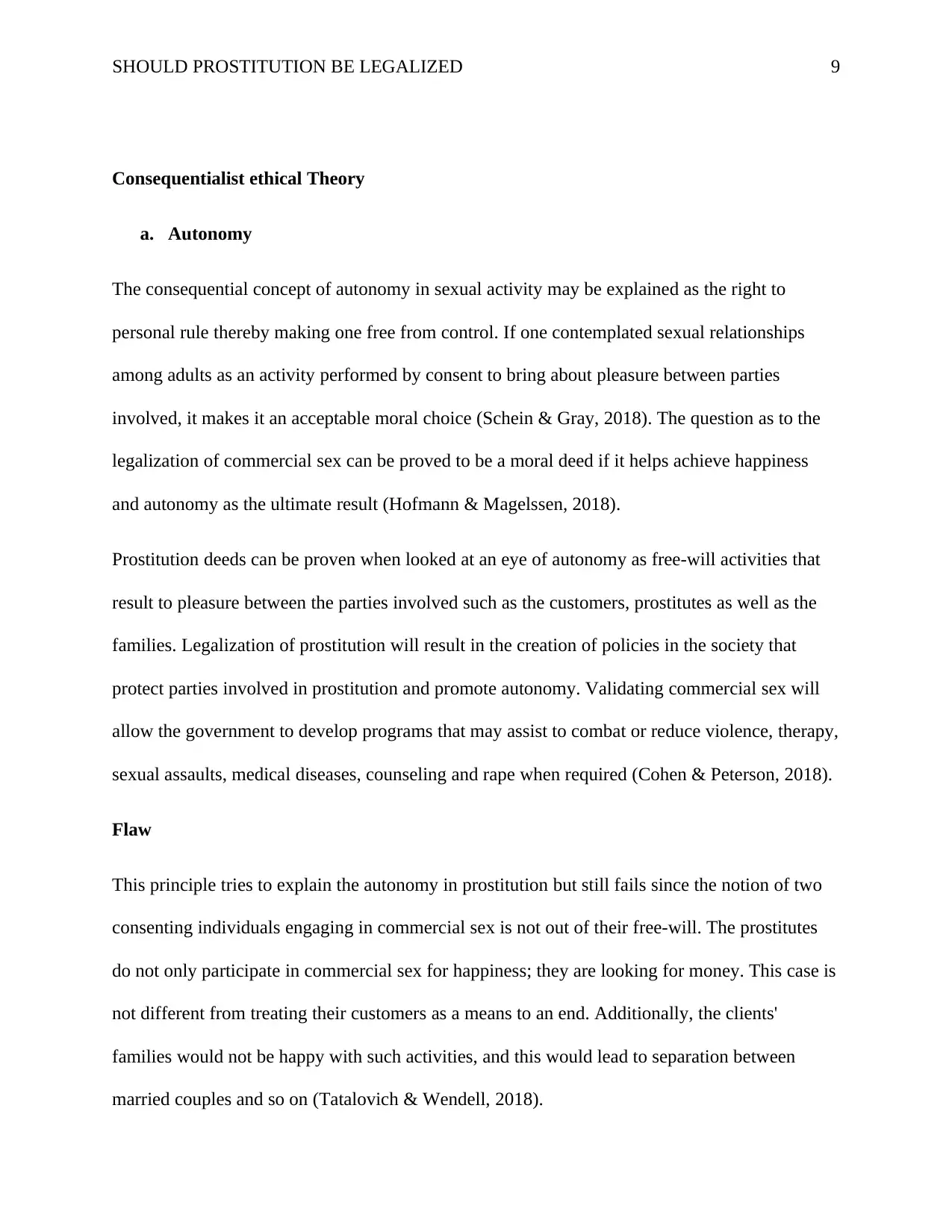
SHOULD PROSTITUTION BE LEGALIZED 9
Consequentialist ethical Theory
a. Autonomy
The consequential concept of autonomy in sexual activity may be explained as the right to
personal rule thereby making one free from control. If one contemplated sexual relationships
among adults as an activity performed by consent to bring about pleasure between parties
involved, it makes it an acceptable moral choice (Schein & Gray, 2018). The question as to the
legalization of commercial sex can be proved to be a moral deed if it helps achieve happiness
and autonomy as the ultimate result (Hofmann & Magelssen, 2018).
Prostitution deeds can be proven when looked at an eye of autonomy as free-will activities that
result to pleasure between the parties involved such as the customers, prostitutes as well as the
families. Legalization of prostitution will result in the creation of policies in the society that
protect parties involved in prostitution and promote autonomy. Validating commercial sex will
allow the government to develop programs that may assist to combat or reduce violence, therapy,
sexual assaults, medical diseases, counseling and rape when required (Cohen & Peterson, 2018).
Flaw
This principle tries to explain the autonomy in prostitution but still fails since the notion of two
consenting individuals engaging in commercial sex is not out of their free-will. The prostitutes
do not only participate in commercial sex for happiness; they are looking for money. This case is
not different from treating their customers as a means to an end. Additionally, the clients'
families would not be happy with such activities, and this would lead to separation between
married couples and so on (Tatalovich & Wendell, 2018).
Consequentialist ethical Theory
a. Autonomy
The consequential concept of autonomy in sexual activity may be explained as the right to
personal rule thereby making one free from control. If one contemplated sexual relationships
among adults as an activity performed by consent to bring about pleasure between parties
involved, it makes it an acceptable moral choice (Schein & Gray, 2018). The question as to the
legalization of commercial sex can be proved to be a moral deed if it helps achieve happiness
and autonomy as the ultimate result (Hofmann & Magelssen, 2018).
Prostitution deeds can be proven when looked at an eye of autonomy as free-will activities that
result to pleasure between the parties involved such as the customers, prostitutes as well as the
families. Legalization of prostitution will result in the creation of policies in the society that
protect parties involved in prostitution and promote autonomy. Validating commercial sex will
allow the government to develop programs that may assist to combat or reduce violence, therapy,
sexual assaults, medical diseases, counseling and rape when required (Cohen & Peterson, 2018).
Flaw
This principle tries to explain the autonomy in prostitution but still fails since the notion of two
consenting individuals engaging in commercial sex is not out of their free-will. The prostitutes
do not only participate in commercial sex for happiness; they are looking for money. This case is
not different from treating their customers as a means to an end. Additionally, the clients'
families would not be happy with such activities, and this would lead to separation between
married couples and so on (Tatalovich & Wendell, 2018).
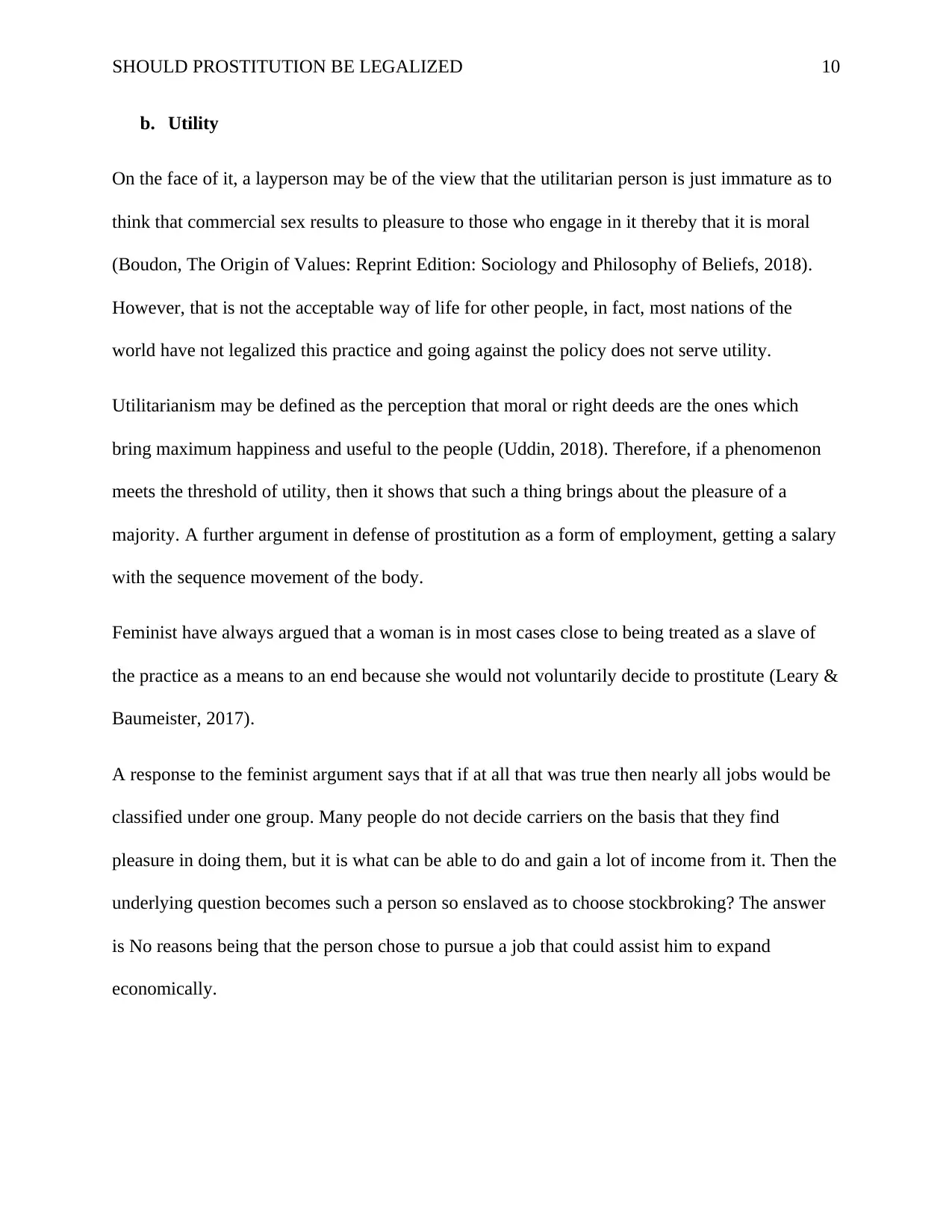
SHOULD PROSTITUTION BE LEGALIZED 10
b. Utility
On the face of it, a layperson may be of the view that the utilitarian person is just immature as to
think that commercial sex results to pleasure to those who engage in it thereby that it is moral
(Boudon, The Origin of Values: Reprint Edition: Sociology and Philosophy of Beliefs, 2018).
However, that is not the acceptable way of life for other people, in fact, most nations of the
world have not legalized this practice and going against the policy does not serve utility.
Utilitarianism may be defined as the perception that moral or right deeds are the ones which
bring maximum happiness and useful to the people (Uddin, 2018). Therefore, if a phenomenon
meets the threshold of utility, then it shows that such a thing brings about the pleasure of a
majority. A further argument in defense of prostitution as a form of employment, getting a salary
with the sequence movement of the body.
Feminist have always argued that a woman is in most cases close to being treated as a slave of
the practice as a means to an end because she would not voluntarily decide to prostitute (Leary &
Baumeister, 2017).
A response to the feminist argument says that if at all that was true then nearly all jobs would be
classified under one group. Many people do not decide carriers on the basis that they find
pleasure in doing them, but it is what can be able to do and gain a lot of income from it. Then the
underlying question becomes such a person so enslaved as to choose stockbroking? The answer
is No reasons being that the person chose to pursue a job that could assist him to expand
economically.
b. Utility
On the face of it, a layperson may be of the view that the utilitarian person is just immature as to
think that commercial sex results to pleasure to those who engage in it thereby that it is moral
(Boudon, The Origin of Values: Reprint Edition: Sociology and Philosophy of Beliefs, 2018).
However, that is not the acceptable way of life for other people, in fact, most nations of the
world have not legalized this practice and going against the policy does not serve utility.
Utilitarianism may be defined as the perception that moral or right deeds are the ones which
bring maximum happiness and useful to the people (Uddin, 2018). Therefore, if a phenomenon
meets the threshold of utility, then it shows that such a thing brings about the pleasure of a
majority. A further argument in defense of prostitution as a form of employment, getting a salary
with the sequence movement of the body.
Feminist have always argued that a woman is in most cases close to being treated as a slave of
the practice as a means to an end because she would not voluntarily decide to prostitute (Leary &
Baumeister, 2017).
A response to the feminist argument says that if at all that was true then nearly all jobs would be
classified under one group. Many people do not decide carriers on the basis that they find
pleasure in doing them, but it is what can be able to do and gain a lot of income from it. Then the
underlying question becomes such a person so enslaved as to choose stockbroking? The answer
is No reasons being that the person chose to pursue a job that could assist him to expand
economically.
Secure Best Marks with AI Grader
Need help grading? Try our AI Grader for instant feedback on your assignments.
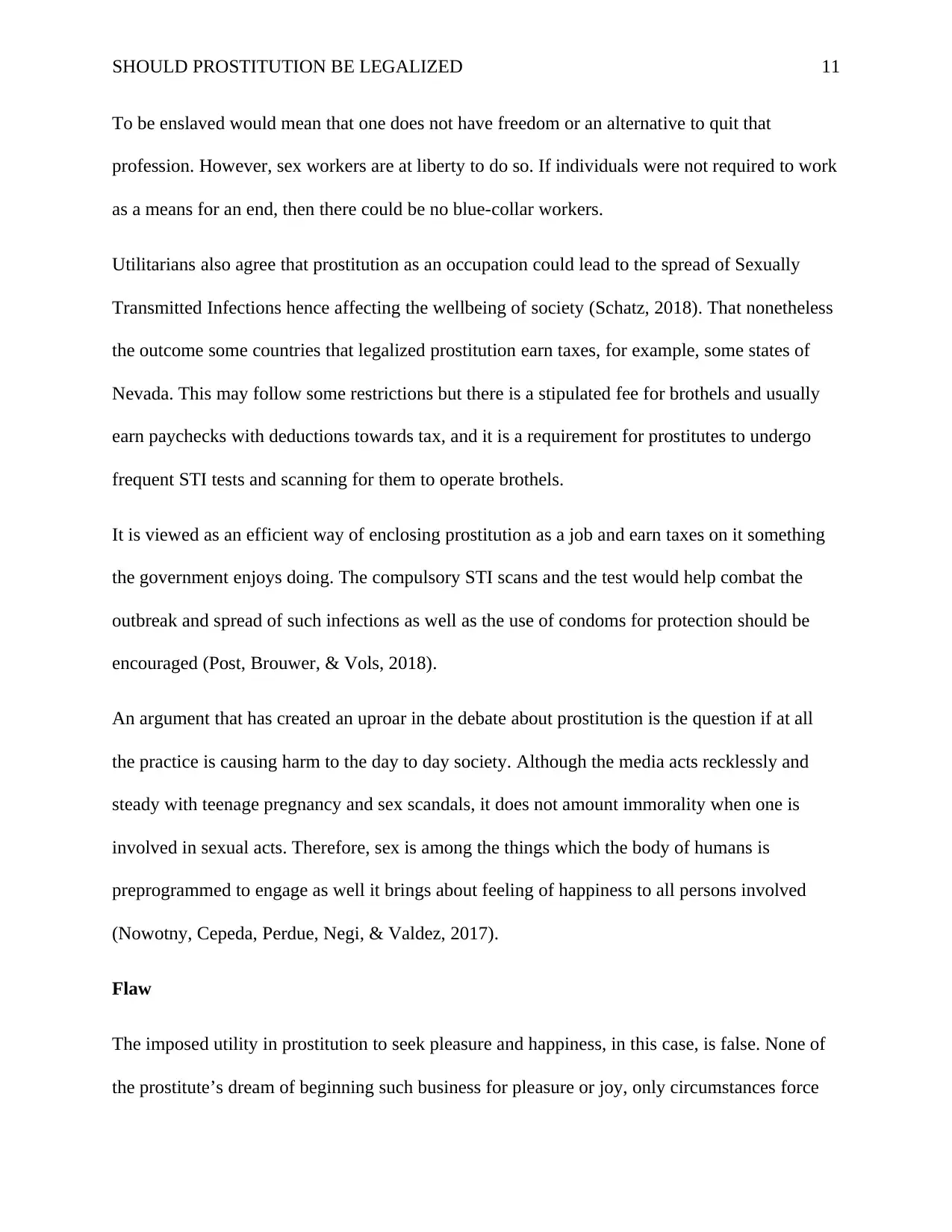
SHOULD PROSTITUTION BE LEGALIZED 11
To be enslaved would mean that one does not have freedom or an alternative to quit that
profession. However, sex workers are at liberty to do so. If individuals were not required to work
as a means for an end, then there could be no blue-collar workers.
Utilitarians also agree that prostitution as an occupation could lead to the spread of Sexually
Transmitted Infections hence affecting the wellbeing of society (Schatz, 2018). That nonetheless
the outcome some countries that legalized prostitution earn taxes, for example, some states of
Nevada. This may follow some restrictions but there is a stipulated fee for brothels and usually
earn paychecks with deductions towards tax, and it is a requirement for prostitutes to undergo
frequent STI tests and scanning for them to operate brothels.
It is viewed as an efficient way of enclosing prostitution as a job and earn taxes on it something
the government enjoys doing. The compulsory STI scans and the test would help combat the
outbreak and spread of such infections as well as the use of condoms for protection should be
encouraged (Post, Brouwer, & Vols, 2018).
An argument that has created an uproar in the debate about prostitution is the question if at all
the practice is causing harm to the day to day society. Although the media acts recklessly and
steady with teenage pregnancy and sex scandals, it does not amount immorality when one is
involved in sexual acts. Therefore, sex is among the things which the body of humans is
preprogrammed to engage as well it brings about feeling of happiness to all persons involved
(Nowotny, Cepeda, Perdue, Negi, & Valdez, 2017).
Flaw
The imposed utility in prostitution to seek pleasure and happiness, in this case, is false. None of
the prostitute’s dream of beginning such business for pleasure or joy, only circumstances force
To be enslaved would mean that one does not have freedom or an alternative to quit that
profession. However, sex workers are at liberty to do so. If individuals were not required to work
as a means for an end, then there could be no blue-collar workers.
Utilitarians also agree that prostitution as an occupation could lead to the spread of Sexually
Transmitted Infections hence affecting the wellbeing of society (Schatz, 2018). That nonetheless
the outcome some countries that legalized prostitution earn taxes, for example, some states of
Nevada. This may follow some restrictions but there is a stipulated fee for brothels and usually
earn paychecks with deductions towards tax, and it is a requirement for prostitutes to undergo
frequent STI tests and scanning for them to operate brothels.
It is viewed as an efficient way of enclosing prostitution as a job and earn taxes on it something
the government enjoys doing. The compulsory STI scans and the test would help combat the
outbreak and spread of such infections as well as the use of condoms for protection should be
encouraged (Post, Brouwer, & Vols, 2018).
An argument that has created an uproar in the debate about prostitution is the question if at all
the practice is causing harm to the day to day society. Although the media acts recklessly and
steady with teenage pregnancy and sex scandals, it does not amount immorality when one is
involved in sexual acts. Therefore, sex is among the things which the body of humans is
preprogrammed to engage as well it brings about feeling of happiness to all persons involved
(Nowotny, Cepeda, Perdue, Negi, & Valdez, 2017).
Flaw
The imposed utility in prostitution to seek pleasure and happiness, in this case, is false. None of
the prostitute’s dream of beginning such business for pleasure or joy, only circumstances force
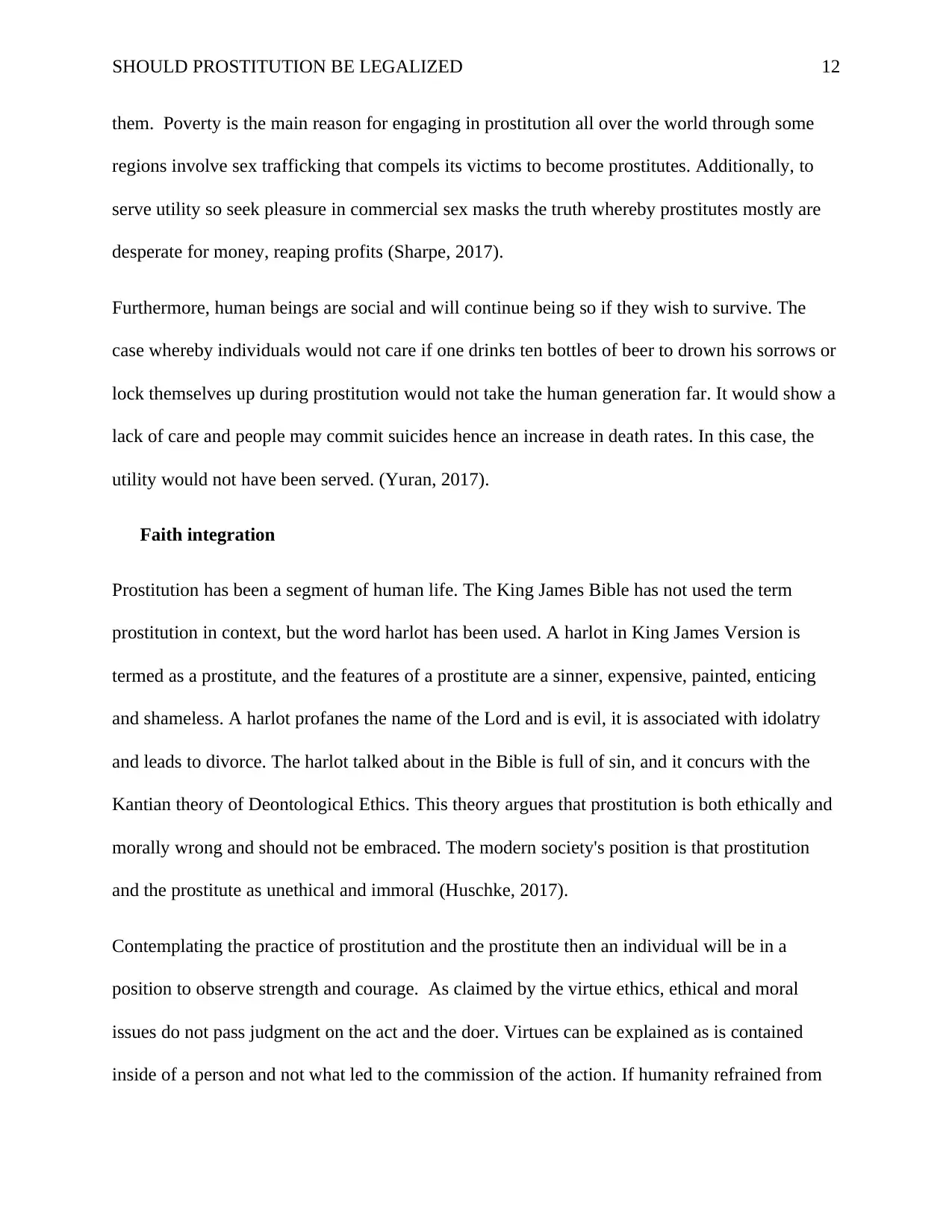
SHOULD PROSTITUTION BE LEGALIZED 12
them. Poverty is the main reason for engaging in prostitution all over the world through some
regions involve sex trafficking that compels its victims to become prostitutes. Additionally, to
serve utility so seek pleasure in commercial sex masks the truth whereby prostitutes mostly are
desperate for money, reaping profits (Sharpe, 2017).
Furthermore, human beings are social and will continue being so if they wish to survive. The
case whereby individuals would not care if one drinks ten bottles of beer to drown his sorrows or
lock themselves up during prostitution would not take the human generation far. It would show a
lack of care and people may commit suicides hence an increase in death rates. In this case, the
utility would not have been served. (Yuran, 2017).
Faith integration
Prostitution has been a segment of human life. The King James Bible has not used the term
prostitution in context, but the word harlot has been used. A harlot in King James Version is
termed as a prostitute, and the features of a prostitute are a sinner, expensive, painted, enticing
and shameless. A harlot profanes the name of the Lord and is evil, it is associated with idolatry
and leads to divorce. The harlot talked about in the Bible is full of sin, and it concurs with the
Kantian theory of Deontological Ethics. This theory argues that prostitution is both ethically and
morally wrong and should not be embraced. The modern society's position is that prostitution
and the prostitute as unethical and immoral (Huschke, 2017).
Contemplating the practice of prostitution and the prostitute then an individual will be in a
position to observe strength and courage. As claimed by the virtue ethics, ethical and moral
issues do not pass judgment on the act and the doer. Virtues can be explained as is contained
inside of a person and not what led to the commission of the action. If humanity refrained from
them. Poverty is the main reason for engaging in prostitution all over the world through some
regions involve sex trafficking that compels its victims to become prostitutes. Additionally, to
serve utility so seek pleasure in commercial sex masks the truth whereby prostitutes mostly are
desperate for money, reaping profits (Sharpe, 2017).
Furthermore, human beings are social and will continue being so if they wish to survive. The
case whereby individuals would not care if one drinks ten bottles of beer to drown his sorrows or
lock themselves up during prostitution would not take the human generation far. It would show a
lack of care and people may commit suicides hence an increase in death rates. In this case, the
utility would not have been served. (Yuran, 2017).
Faith integration
Prostitution has been a segment of human life. The King James Bible has not used the term
prostitution in context, but the word harlot has been used. A harlot in King James Version is
termed as a prostitute, and the features of a prostitute are a sinner, expensive, painted, enticing
and shameless. A harlot profanes the name of the Lord and is evil, it is associated with idolatry
and leads to divorce. The harlot talked about in the Bible is full of sin, and it concurs with the
Kantian theory of Deontological Ethics. This theory argues that prostitution is both ethically and
morally wrong and should not be embraced. The modern society's position is that prostitution
and the prostitute as unethical and immoral (Huschke, 2017).
Contemplating the practice of prostitution and the prostitute then an individual will be in a
position to observe strength and courage. As claimed by the virtue ethics, ethical and moral
issues do not pass judgment on the act and the doer. Virtues can be explained as is contained
inside of a person and not what led to the commission of the action. If humanity refrained from
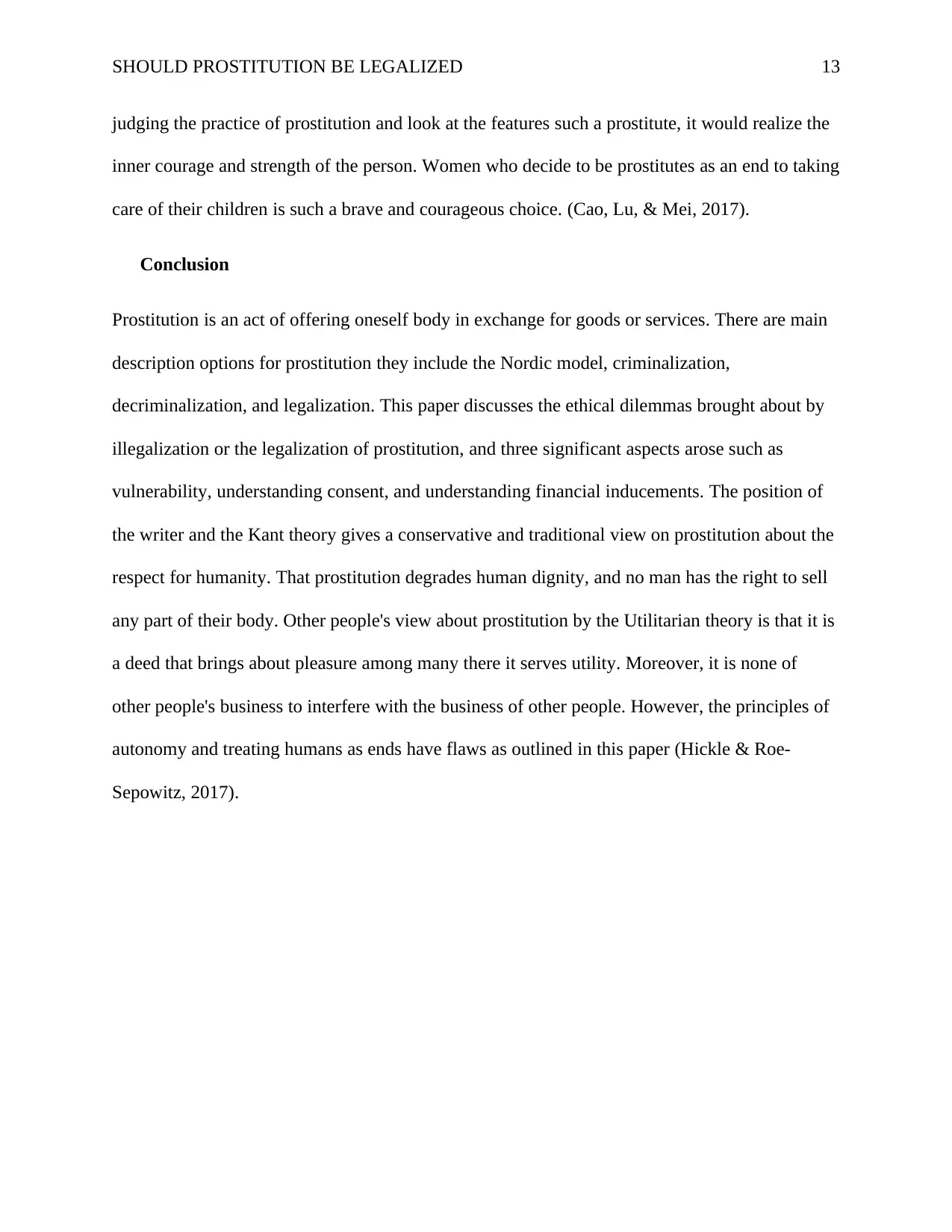
SHOULD PROSTITUTION BE LEGALIZED 13
judging the practice of prostitution and look at the features such a prostitute, it would realize the
inner courage and strength of the person. Women who decide to be prostitutes as an end to taking
care of their children is such a brave and courageous choice. (Cao, Lu, & Mei, 2017).
Conclusion
Prostitution is an act of offering oneself body in exchange for goods or services. There are main
description options for prostitution they include the Nordic model, criminalization,
decriminalization, and legalization. This paper discusses the ethical dilemmas brought about by
illegalization or the legalization of prostitution, and three significant aspects arose such as
vulnerability, understanding consent, and understanding financial inducements. The position of
the writer and the Kant theory gives a conservative and traditional view on prostitution about the
respect for humanity. That prostitution degrades human dignity, and no man has the right to sell
any part of their body. Other people's view about prostitution by the Utilitarian theory is that it is
a deed that brings about pleasure among many there it serves utility. Moreover, it is none of
other people's business to interfere with the business of other people. However, the principles of
autonomy and treating humans as ends have flaws as outlined in this paper (Hickle & Roe-
Sepowitz, 2017).
judging the practice of prostitution and look at the features such a prostitute, it would realize the
inner courage and strength of the person. Women who decide to be prostitutes as an end to taking
care of their children is such a brave and courageous choice. (Cao, Lu, & Mei, 2017).
Conclusion
Prostitution is an act of offering oneself body in exchange for goods or services. There are main
description options for prostitution they include the Nordic model, criminalization,
decriminalization, and legalization. This paper discusses the ethical dilemmas brought about by
illegalization or the legalization of prostitution, and three significant aspects arose such as
vulnerability, understanding consent, and understanding financial inducements. The position of
the writer and the Kant theory gives a conservative and traditional view on prostitution about the
respect for humanity. That prostitution degrades human dignity, and no man has the right to sell
any part of their body. Other people's view about prostitution by the Utilitarian theory is that it is
a deed that brings about pleasure among many there it serves utility. Moreover, it is none of
other people's business to interfere with the business of other people. However, the principles of
autonomy and treating humans as ends have flaws as outlined in this paper (Hickle & Roe-
Sepowitz, 2017).
Paraphrase This Document
Need a fresh take? Get an instant paraphrase of this document with our AI Paraphraser
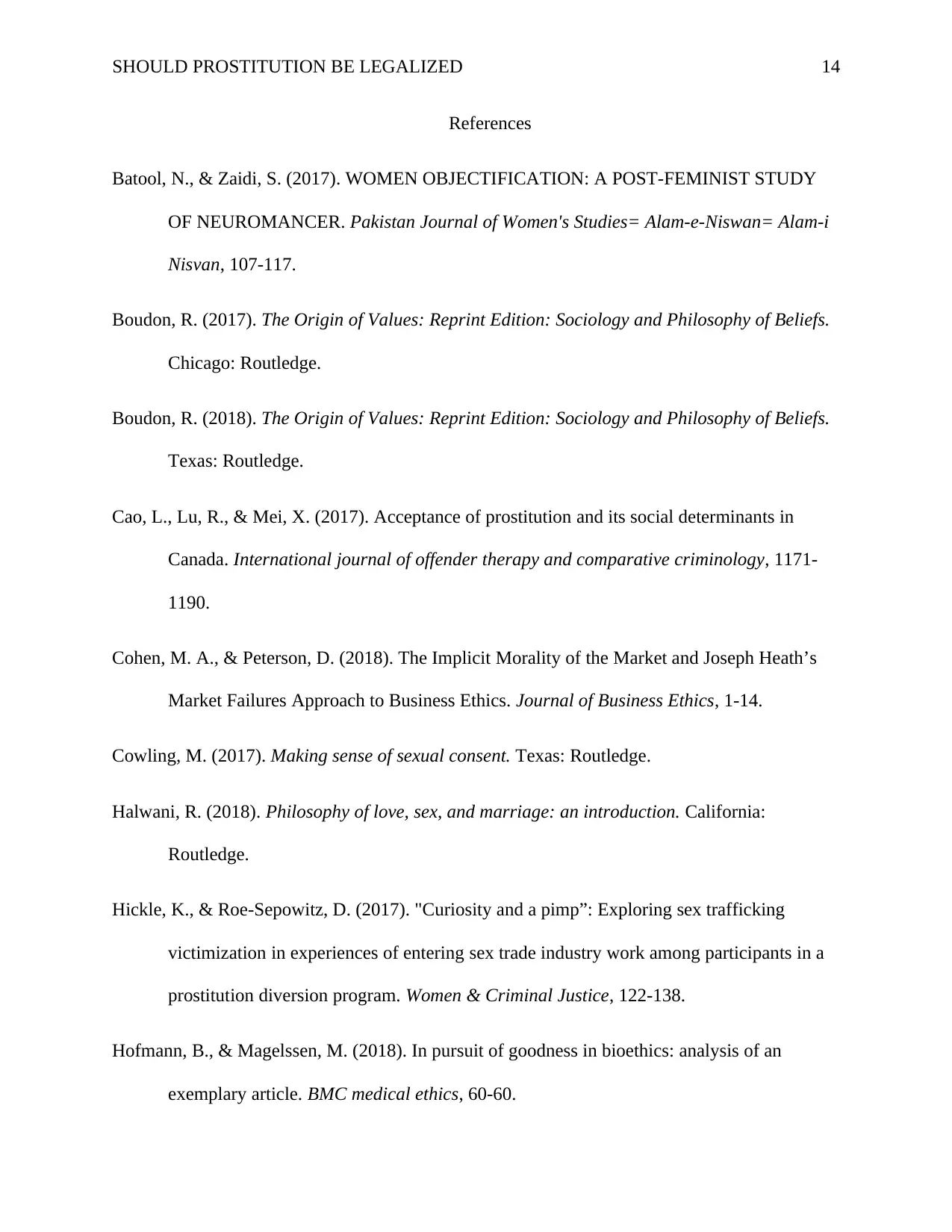
SHOULD PROSTITUTION BE LEGALIZED 14
References
Batool, N., & Zaidi, S. (2017). WOMEN OBJECTIFICATION: A POST-FEMINIST STUDY
OF NEUROMANCER. Pakistan Journal of Women's Studies= Alam-e-Niswan= Alam-i
Nisvan, 107-117.
Boudon, R. (2017). The Origin of Values: Reprint Edition: Sociology and Philosophy of Beliefs.
Chicago: Routledge.
Boudon, R. (2018). The Origin of Values: Reprint Edition: Sociology and Philosophy of Beliefs.
Texas: Routledge.
Cao, L., Lu, R., & Mei, X. (2017). Acceptance of prostitution and its social determinants in
Canada. International journal of offender therapy and comparative criminology, 1171-
1190.
Cohen, M. A., & Peterson, D. (2018). The Implicit Morality of the Market and Joseph Heath’s
Market Failures Approach to Business Ethics. Journal of Business Ethics, 1-14.
Cowling, M. (2017). Making sense of sexual consent. Texas: Routledge.
Halwani, R. (2018). Philosophy of love, sex, and marriage: an introduction. California:
Routledge.
Hickle, K., & Roe-Sepowitz, D. (2017). "Curiosity and a pimp”: Exploring sex trafficking
victimization in experiences of entering sex trade industry work among participants in a
prostitution diversion program. Women & Criminal Justice, 122-138.
Hofmann, B., & Magelssen, M. (2018). In pursuit of goodness in bioethics: analysis of an
exemplary article. BMC medical ethics, 60-60.
References
Batool, N., & Zaidi, S. (2017). WOMEN OBJECTIFICATION: A POST-FEMINIST STUDY
OF NEUROMANCER. Pakistan Journal of Women's Studies= Alam-e-Niswan= Alam-i
Nisvan, 107-117.
Boudon, R. (2017). The Origin of Values: Reprint Edition: Sociology and Philosophy of Beliefs.
Chicago: Routledge.
Boudon, R. (2018). The Origin of Values: Reprint Edition: Sociology and Philosophy of Beliefs.
Texas: Routledge.
Cao, L., Lu, R., & Mei, X. (2017). Acceptance of prostitution and its social determinants in
Canada. International journal of offender therapy and comparative criminology, 1171-
1190.
Cohen, M. A., & Peterson, D. (2018). The Implicit Morality of the Market and Joseph Heath’s
Market Failures Approach to Business Ethics. Journal of Business Ethics, 1-14.
Cowling, M. (2017). Making sense of sexual consent. Texas: Routledge.
Halwani, R. (2018). Philosophy of love, sex, and marriage: an introduction. California:
Routledge.
Hickle, K., & Roe-Sepowitz, D. (2017). "Curiosity and a pimp”: Exploring sex trafficking
victimization in experiences of entering sex trade industry work among participants in a
prostitution diversion program. Women & Criminal Justice, 122-138.
Hofmann, B., & Magelssen, M. (2018). In pursuit of goodness in bioethics: analysis of an
exemplary article. BMC medical ethics, 60-60.
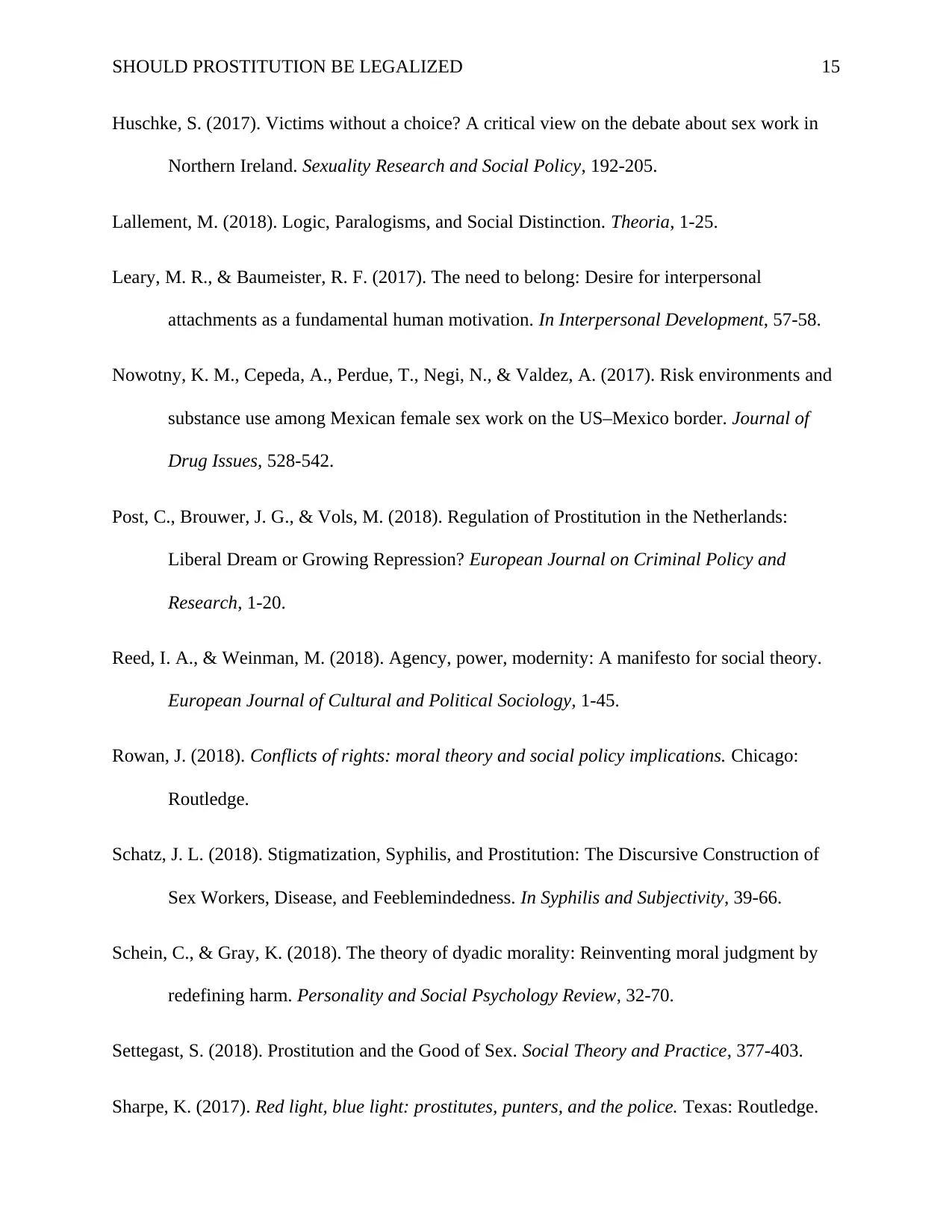
SHOULD PROSTITUTION BE LEGALIZED 15
Huschke, S. (2017). Victims without a choice? A critical view on the debate about sex work in
Northern Ireland. Sexuality Research and Social Policy, 192-205.
Lallement, M. (2018). Logic, Paralogisms, and Social Distinction. Theoria, 1-25.
Leary, M. R., & Baumeister, R. F. (2017). The need to belong: Desire for interpersonal
attachments as a fundamental human motivation. In Interpersonal Development, 57-58.
Nowotny, K. M., Cepeda, A., Perdue, T., Negi, N., & Valdez, A. (2017). Risk environments and
substance use among Mexican female sex work on the US–Mexico border. Journal of
Drug Issues, 528-542.
Post, C., Brouwer, J. G., & Vols, M. (2018). Regulation of Prostitution in the Netherlands:
Liberal Dream or Growing Repression? European Journal on Criminal Policy and
Research, 1-20.
Reed, I. A., & Weinman, M. (2018). Agency, power, modernity: A manifesto for social theory.
European Journal of Cultural and Political Sociology, 1-45.
Rowan, J. (2018). Conflicts of rights: moral theory and social policy implications. Chicago:
Routledge.
Schatz, J. L. (2018). Stigmatization, Syphilis, and Prostitution: The Discursive Construction of
Sex Workers, Disease, and Feeblemindedness. In Syphilis and Subjectivity, 39-66.
Schein, C., & Gray, K. (2018). The theory of dyadic morality: Reinventing moral judgment by
redefining harm. Personality and Social Psychology Review, 32-70.
Settegast, S. (2018). Prostitution and the Good of Sex. Social Theory and Practice, 377-403.
Sharpe, K. (2017). Red light, blue light: prostitutes, punters, and the police. Texas: Routledge.
Huschke, S. (2017). Victims without a choice? A critical view on the debate about sex work in
Northern Ireland. Sexuality Research and Social Policy, 192-205.
Lallement, M. (2018). Logic, Paralogisms, and Social Distinction. Theoria, 1-25.
Leary, M. R., & Baumeister, R. F. (2017). The need to belong: Desire for interpersonal
attachments as a fundamental human motivation. In Interpersonal Development, 57-58.
Nowotny, K. M., Cepeda, A., Perdue, T., Negi, N., & Valdez, A. (2017). Risk environments and
substance use among Mexican female sex work on the US–Mexico border. Journal of
Drug Issues, 528-542.
Post, C., Brouwer, J. G., & Vols, M. (2018). Regulation of Prostitution in the Netherlands:
Liberal Dream or Growing Repression? European Journal on Criminal Policy and
Research, 1-20.
Reed, I. A., & Weinman, M. (2018). Agency, power, modernity: A manifesto for social theory.
European Journal of Cultural and Political Sociology, 1-45.
Rowan, J. (2018). Conflicts of rights: moral theory and social policy implications. Chicago:
Routledge.
Schatz, J. L. (2018). Stigmatization, Syphilis, and Prostitution: The Discursive Construction of
Sex Workers, Disease, and Feeblemindedness. In Syphilis and Subjectivity, 39-66.
Schein, C., & Gray, K. (2018). The theory of dyadic morality: Reinventing moral judgment by
redefining harm. Personality and Social Psychology Review, 32-70.
Settegast, S. (2018). Prostitution and the Good of Sex. Social Theory and Practice, 377-403.
Sharpe, K. (2017). Red light, blue light: prostitutes, punters, and the police. Texas: Routledge.
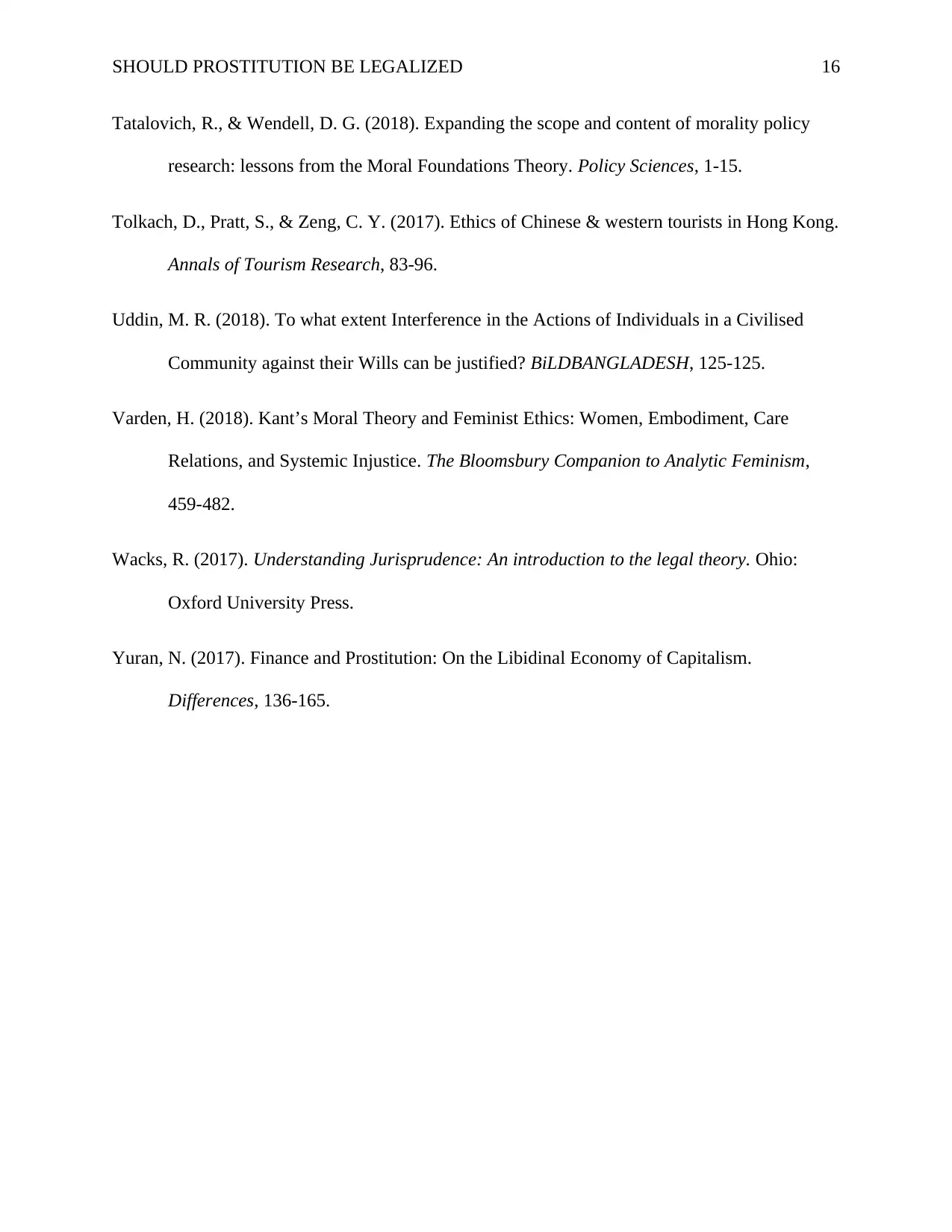
SHOULD PROSTITUTION BE LEGALIZED 16
Tatalovich, R., & Wendell, D. G. (2018). Expanding the scope and content of morality policy
research: lessons from the Moral Foundations Theory. Policy Sciences, 1-15.
Tolkach, D., Pratt, S., & Zeng, C. Y. (2017). Ethics of Chinese & western tourists in Hong Kong.
Annals of Tourism Research, 83-96.
Uddin, M. R. (2018). To what extent Interference in the Actions of Individuals in a Civilised
Community against their Wills can be justified? BiLDBANGLADESH, 125-125.
Varden, H. (2018). Kant’s Moral Theory and Feminist Ethics: Women, Embodiment, Care
Relations, and Systemic Injustice. The Bloomsbury Companion to Analytic Feminism,
459-482.
Wacks, R. (2017). Understanding Jurisprudence: An introduction to the legal theory. Ohio:
Oxford University Press.
Yuran, N. (2017). Finance and Prostitution: On the Libidinal Economy of Capitalism.
Differences, 136-165.
Tatalovich, R., & Wendell, D. G. (2018). Expanding the scope and content of morality policy
research: lessons from the Moral Foundations Theory. Policy Sciences, 1-15.
Tolkach, D., Pratt, S., & Zeng, C. Y. (2017). Ethics of Chinese & western tourists in Hong Kong.
Annals of Tourism Research, 83-96.
Uddin, M. R. (2018). To what extent Interference in the Actions of Individuals in a Civilised
Community against their Wills can be justified? BiLDBANGLADESH, 125-125.
Varden, H. (2018). Kant’s Moral Theory and Feminist Ethics: Women, Embodiment, Care
Relations, and Systemic Injustice. The Bloomsbury Companion to Analytic Feminism,
459-482.
Wacks, R. (2017). Understanding Jurisprudence: An introduction to the legal theory. Ohio:
Oxford University Press.
Yuran, N. (2017). Finance and Prostitution: On the Libidinal Economy of Capitalism.
Differences, 136-165.
1 out of 16
Your All-in-One AI-Powered Toolkit for Academic Success.
+13062052269
info@desklib.com
Available 24*7 on WhatsApp / Email
![[object Object]](/_next/static/media/star-bottom.7253800d.svg)
Unlock your academic potential
© 2024 | Zucol Services PVT LTD | All rights reserved.